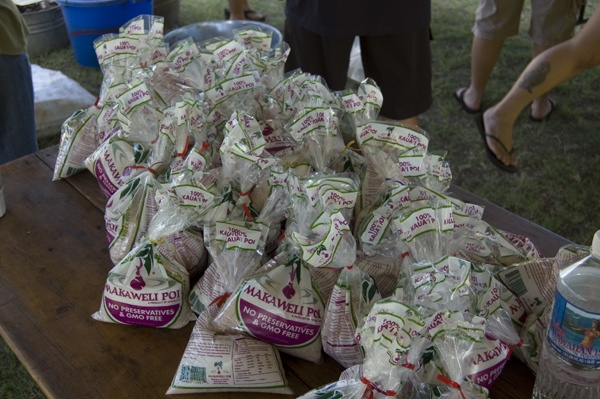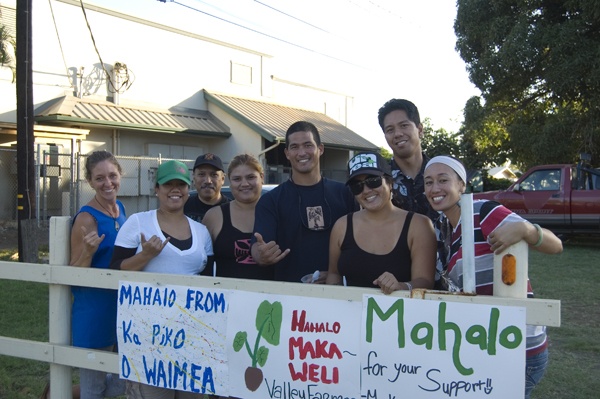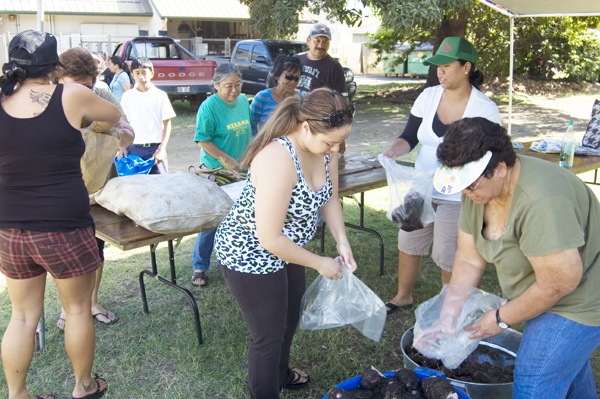WAIMEA — On a warm afternoon, a group of taro farmers and supporters of Ka Piko o Waimea gathered to thank the community for its support in recent years of the Makaweli Poi Mill. While there are many issues still
WAIMEA — On a warm afternoon, a group of taro farmers and supporters of Ka Piko o Waimea gathered to thank the community for its support in recent years of the Makaweli Poi Mill.
While there are many issues still be addressed between the groups that operated the poi mill and the entities they were working with the Office of Hawaiian Affairs, the event Friday afternoon was very low key and served as way to offer thanks to longtime customers and supporters. Six farmers donated more than a thousand pounds of kalo, which is the Hawaiian word for taro.
“Basically, today was like a mahalo to the community, to thank them for supporting Makaweli Poi. Keep it positive,” said John A‘ana, a Waimea farmer who helped organize the event.
The rooted vegetables were transported in heavy jute bags before being placed into heavy plastic bins filled with water to keep the kalo from drying out.
As friends and ‘ohana arrived at the site, they offered one another warm honi and embraces before receiving their bags of taro and talking story about the events of recent weeks, along with discussing plans and ideas for the future of kalo farming, poi production and distribution.
Those driving past the kalo giveaway site bumped their car horns in support of the event.
Some customers quietly slipped monetary donations into a koa bowl, but the bags of fresh kalo along with stems that could be used for replanting were free for the taking.
Tama Ta‘ala brought in a box of Hawaiian salt offered in Makaweli Poi bags to give to anyone who stopped by as a gesture of thanks.
“We’re sending up taro for the opening day of the Legislature,” said A‘ana of where he would send his next harvest in order to perpetuate the history and education of the root, and also to “get the next generation engaged and growing food for the community.”
A‘ana wants to see the next generation get involved and engaged in growing taro. He learned how to farm from his father and has been farming for more than 35 years on his grandfather’s land in Makaweli Valley.
“We can trace our ancestry all the way back to the Makaweli Valley,” A‘ana said.
In recent years, more and more old-time farmers were being lost to the ages and kalo production rates dropped.
For this reason, OHA took over the mill in 2008 to help the poi mill financially and help the farmers get back on their feet.
A‘ana said kalo production rates were finally on the upswing and the mill was on the verge of being self-sufficient again when, “OHA pulled the rug out from under us.”
“They never put any money towards that and never turned it over to the community either,” he said.
Bryna Storch, former manager of Makaweli Poi, said she wants to focus on saving the poi mill and keep it as a community resource run by and for farmers. She is concerned about longtime customers of Makaweli Poi and wants to be able to use volunteer support as well as provide educational opportunities for young people.
Storch has worked with taro for several years. She said she feels good about the plans that are shaping up to support farmers, “and using what we know.”
“Makaweli Poi is one of the primary Hawaiian contributors to Hawaiian food security,” Storch said, explaining that demand for poi is high right now.
She also expressed concern over what will happen to the equipment, which carries a long legacy with it.
A‘ana said that when they set up Waimea Poi, the group got specialized equipment from the now defunct Kalihi Poi, but the Waimea Poi Mill shut down after Hurricane ‘Iniki and eventually became Makaweli Poi.
“It’s not just a bunch of equipment thrown together,” said Storch. “Everyone here has had some shape or share of making it better for years and years. It’s tools to make food for the whole community.”
Storch said that of the poi that was produced, the mill employees also reached out to people in the community who were ill, offering them free poi in their time of greatest need. For that, people have long been loyal to Makaweli Poi.
“Poi is medicine for the community,” Storch said. “We’re always there for the community.”




